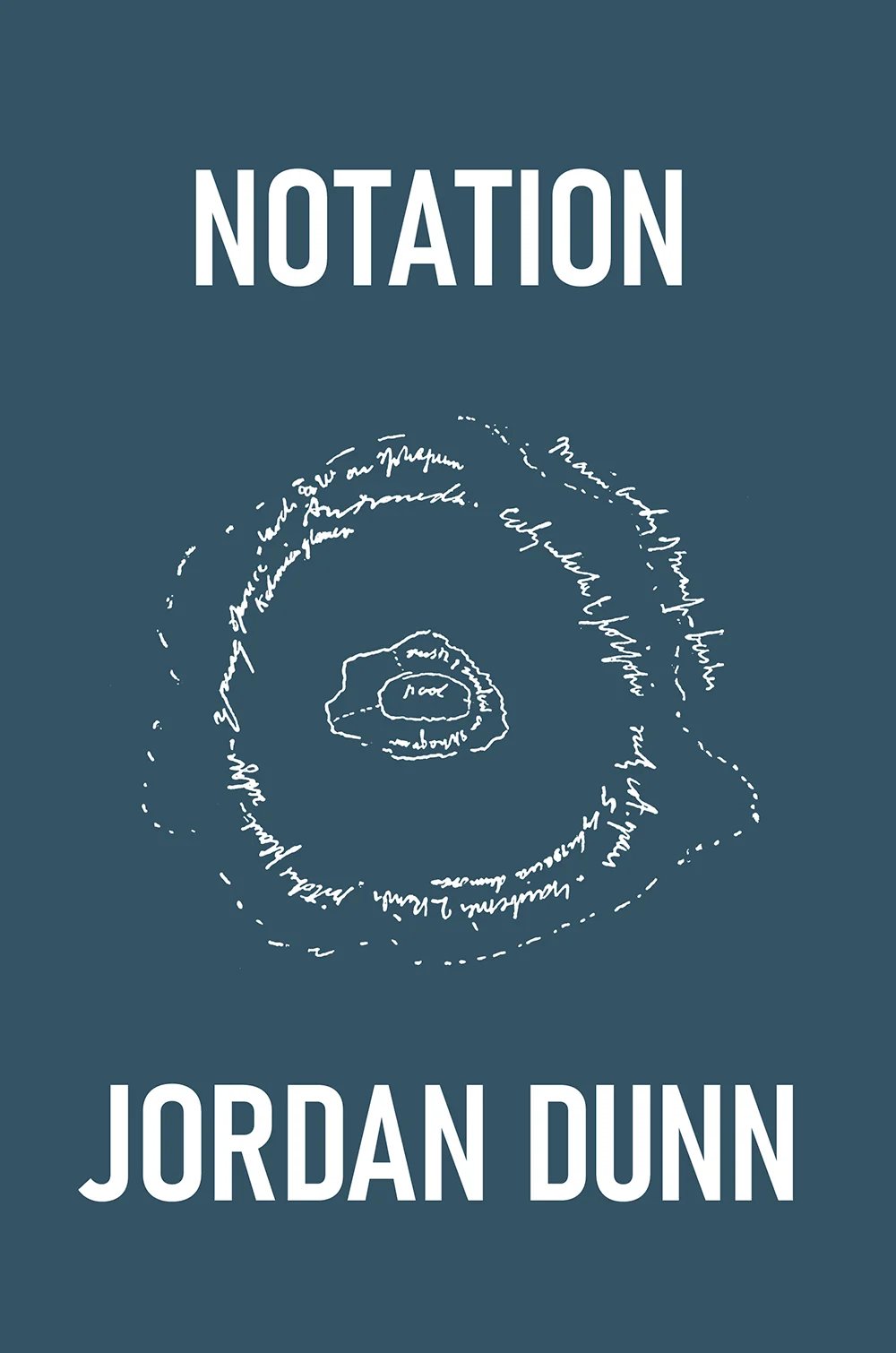Notation
Thirdhand Books
Poetry
Notation consists of a single poetic line that navigates the contours of memory following the death of a friend. Broadened by companionship, reading, nature study, and travel, Notation questions the boundaries of book and authorship, weaving numerous texts together with close observations of daily life. For Jordan Dunn, “the idea of the perfect book remains thousands of unbound sheets, photographs, and notes spread across a vast table.” The practice of taking note, of writing the now as it happens, gathers the living—the people we haven’t lost, those here with us in time.
Read online excerpts:
Annulet: 4-14-24
Cleveland Review of Books
Praise
Grief tears up our roots and sets us astray in the world, and leaves us, if we’re lucky, as nothing more than a seed in a gale; and hope’s lonely question might only ask, how to grow a root again? Jordan Dunn’s extraordinary Notation isn’t an elegy exactly, but is an elegy superlatively, seeking through attention so focused on the worldly it borders on prayer. Part field guide, part daybook, part friendship journal, part shepherd’s calendar, part pilgrim’s quest, part mourner’s placeless lament, these poems offer daily detail as intimate revelation. I don’t know if it can save us, but might well be the best company I can imagine in time’s general doom. What higher praise is there? These are poems that leave us, in our unbreakable solitude, less alone. So the root lets itself grow. – DAN BEACHY-QUICK
Vivid, persistent particulars contrast with long, loping sentences, sometimes covering pages, to establish what Jordan Dunn refers to in Notation as “an ethics of presence”—or was it someone else who said that? He interweaves his own voice with so many others until they all gel into a single felted voice that is, in itself, a community, and that, in itself, is an ethical gesture. It’s a community of attention—as he, or someone, says: “more of a power of attunement than a power of creation”—bringing plants, birds, friends, and readers together through a meticulous commitment to the moment—and he keeps us there in the middle of it, mesmerized by its continuous unfolding. – COLE SWENSEN
“What it means to be certain is less interesting than what it means to be uncertain, though I’m forever lost between them in my willingness to replay the past,” Jordan Dunn writes in Notation, a precise, perambulatory meditation on grief, friendship, and the possibilities and limitations of writing as a practice of meaning making. Here, memory is “not a narrative structure but rather a vast heap of experience tangled together,” a walk can be a poem, what we learn from closeness to books is as important as what we learn from their sentences, and sensory details coalesce into landscapes that need not reform into stories. In this tender and intelligent book, looking back is also looking forward, since “all places are available for beginning.” – LAUREN RUSSELL
What Jordan Dunn is doing here is daring in the extreme, and the result is an extraordinarily beautiful book. Nowhere else will a reader find a sustained attention to the natural world—its sounds, creatures, seedlings, grasses, its minutiae and immensities—so dynamically interfused with the poet’s mode of perception and the voices of others. Notation dares to make a study of grief, memory, and daily experience that renews the very concept of studiousness and, layer by layer, reveals that at the heart of such an undertaking lies the vulnerability of the dedicated, singularly observant, and porous self. It feels only accurate to invoke Proust, given the poem’s attunements to what Dunn calls “the invisible matter of the interlayered network of being” and the depths and complexities of what’s discovered. Notation’s very sentences, breathtakingly agile and word-rooted, turn the abstraction of time into phenomena, as the work tunes and re-tunes itself “to being and memory and the wave-like flux between them.” Throughout, a poetics of humility no less than of self-examination underpins this profoundly moving book of mourning and making. – LISA FISHMAN
In Notation, Jordan Dunn practices a mode in which attention, song, and writing are married as marks within “an open frame that functions as a material network.” By virtue of its openness, this book creates a nonce network of friends, family, books, species, and places that meet in a self at once nomadic and chthonic, enchanted by the world and deeply wounded by it. Though at its core Notation grieves the loss of the author’s beloved friend, it is also simply the record of keeping a record, “not a narrative structure but rather a vast heap of experience tangled together in the most inextricable form.” The genius of this book lies in how Dunn combs out the tangles of experience without robbing them of their complex formal inextricability: here we have a book of devotion whose author has taken a vow to include everything, exclude nothing. In doing so, Dunn makes beauty radical, radiant with the shadow of its opposite. – BRIAN TEARE
